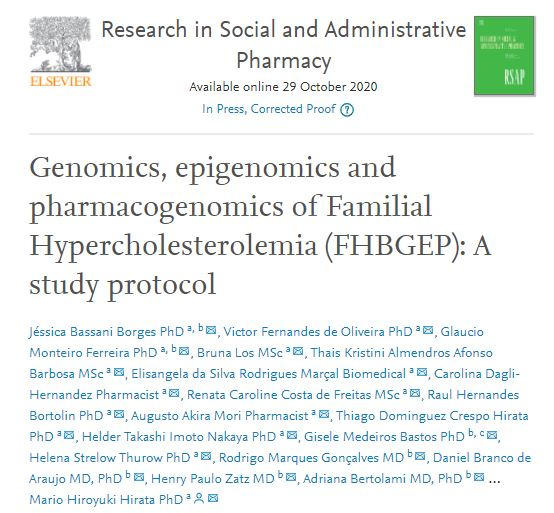Genomics, epigenomics and pharmacogenomics of Familial Hypercholesterolemia (FHBGEP): A study protocol.
Familial hypercholesterolemia (FH) is a genetic disease that affects millions of people worldwide. The study protocol FHBGEP was design to investigate the main genomic, epigenomic, and pharmacogenomic factors associated with FH and polygenic hypercholesterolemia (PH). FH patients will be enrolled at six research centers in Brazil. An exon-targeted gene strategy will be used to sequence a panel of 84 genes related to FH, PH, pharmacogenomics and coronary artery disease. Variants in coding and regulatory regions will be identified using a proposed variant discovery pipeline and classified according to the American College Medical Genetics guidelines. Functional effects of variants in FH-related genes will be investigated by in vitro studies using lymphocytes and cell lines (HepG2, HUVEC and HEK293FT), CRISPR/Cas9 mutagenesis, luciferase reporter assay and other technologies. Functional studies in silico, such as molecular docking, molecular dynamics, and conformational analysis, will be used to explore the impact of novel variants on protein structure and function. DNA methylation profile and differential expression of circulating non-coding RNAs (miRNAs and lncRNAs) will be analyzed in FH patients and normolipidemic subjects (control group). The influence of genomic and epigenomic factors on metabolic and inflammatory status will be analyzed in FH patients. Pharmacogenomic studies will be conducted to investigate the influence of genomic and epigenomic factors on response to statins in FH patients. The FHBGEP protocol has the potential to elucidate the genetic basis and molecular mechanisms involved in the pathophysiology of FH and PH, particularly in the Brazilian population. This pioneering approach includes genomic, epigenomic and functional studies, which results will contribute to the improvement of the diagnosis, prognosis and personalized therapy of FH patients.
Authors
Jéssica Bassani Borges; Victor Fernandes de Oliveira; Glaucio Monteiro Ferreira; Bruna Los; Thais Kristini Almendros Afonso Barbosa; Elisangela da Silva Rodrigues Marçal; Carolina Dagli-Hernandez; Renata Caroline Costa de Freitas; Raul Hernandes Bortolin; Augusto Akira Mori; Thiago Dominguez Crespo Hirata; Helder Takashi Imoto Nakaya; Gisele Medeiros Bastos; Helena Strelow Thurow; Rodrigo Marques Gonçalves; Daniel Branco de Araujo; Henry Paulo Zatz; Adriana Bertolami; André Arpad Faludi; Marcelo Chiara Bertolami; Amanda Guerra de Moraes Rego Sousa; João Ítalo Dias França; Cinthia Elim Jannes; Alexandre da Costa Pereira; Marcelo Arruda Nakazone; Dorotéia Rossi Silva Souza; Tayanne Silva Carmo; Marcelo Ferraz Sampaio; Renata Gorjão; Tania Cristina Pithon-Curi; Patricia Moriel; Vivian Nogueira Silbiger; André Ducati Luchessi; Jéssica Nayara Góes de Araújo; Michel Satya Naslavsky; Jaqueline Yu Ting Wang; Thales Kronenberger; Alvaro Cerda; Hui Tzu Lin-Wang; Adriana Regina Garofalo; Cristina Moreno Fajardo; Rosario Dominguez Crespo Hirata; Mario Hiroyuki Hirata
External link
Publication Year
Publication Journal
Associeted Project
Integrative Biology
Lista de serviços
-
Gene regulatory and signaling networks exhibit distinct topological distributions of motifs.Gene regulatory and signaling networks exhibit distinct topological distributions of motifs.
-
Gene signatures of autopsy lungs from obese patients with COVID-19.Gene signatures of autopsy lungs from obese patients with COVID-19.
-
Network Medicine: Methods and ApplicationsNetwork Medicine: Methods and Applications
-
ACE2 Expression Is Increased in the Lungs of Patients With Comorbidities Associated With Severe COVID-19.ACE2 Expression Is Increased in the Lungs of Patients With Comorbidities Associated With Severe COVID-19.
-
Drug repositioning for psychiatric and neurological disorders through a network medicine approach.Drug repositioning for psychiatric and neurological disorders through a network medicine approach.
-
Linking proteomic alterations in schizophrenia hippocampus to NMDAr hypofunction in human neurons and oligodendrocytes.Linking proteomic alterations in schizophrenia hippocampus to NMDAr hypofunction in human neurons and oligodendrocytes.
-
In-depth analysis of laboratory parameters reveals the interplay between sex, age, and systemic inflammation in individuals with COVID-19.In-depth analysis of laboratory parameters reveals the interplay between sex, age, and systemic inflammation in individuals with COVID-19.
-
The evolution of knowledge on genes associated with human diseasesThe evolution of knowledge on genes associated with human diseases
-
Network vaccinology.Network vaccinology.
-
Pyruvate kinase M2 mediates IL-17 signaling in keratinocytes driving psoriatic skin inflammationPyruvate kinase M2 mediates IL-17 signaling in keratinocytes driving psoriatic skin inflammation
-
Transcriptome analysis of six tissues obtained post-mortem from sepsis patientsTranscriptome analysis of six tissues obtained post-mortem from sepsis patients
-
Gene Signatures of Symptomatic and Asymptomatic Clinical-Immunological Profiles of Human Infection by Leishmania (L.) chagasi in Amazonian BrazilGene Signatures of Symptomatic and Asymptomatic Clinical-Immunological Profiles of Human Infection by Leishmania (L.) chagasi in Amazonian Brazil
-
In vitro morphological profiling of T cells predicts clinical response to natalizumab therapy in patients with multiple sclerosis.In vitro morphological profiling of T cells predicts clinical response to natalizumab therapy in patients with multiple sclerosis.
-
Integrative immunology identified interferome signatures in uveitis and systemic disease-associated uveitis.Integrative immunology identified interferome signatures in uveitis and systemic disease-associated uveitis.
-
Gene regulatory networks analysis for the discovery of prognostic genes in gliomas.Gene regulatory networks analysis for the discovery of prognostic genes in gliomas.
-
Revealing shared molecular drivers of brain metastases from distinct primary tumors.Revealing shared molecular drivers of brain metastases from distinct primary tumors.

